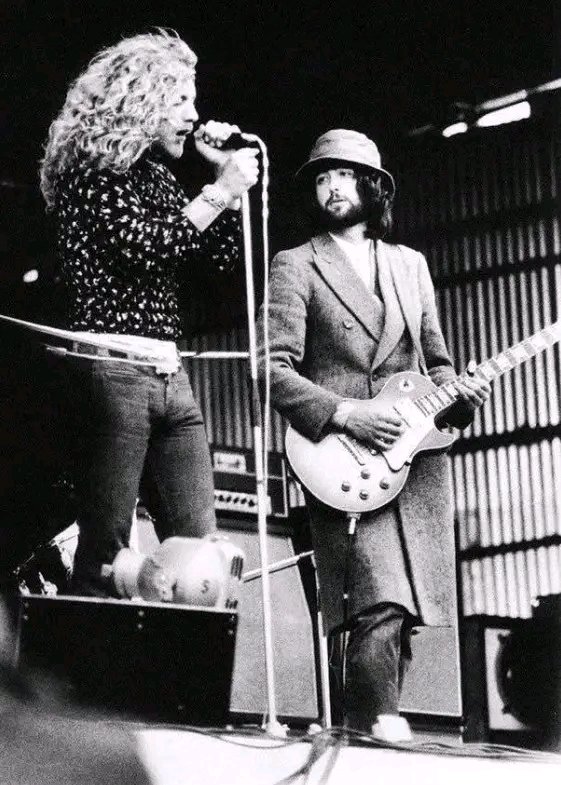“Led Zeppelin’s Triumphant Ascent at the Bath Festival of Blues and Progressive Music: A Night of Raw Power, Historic Firsts, and Rock Immortality”
On June 28, 1970, the tranquil fields of Shepton Mallet in Somerset, England, transformed into sacred ground for rock history as Led Zeppelin headlined the Bath Festival of Blues and Progressive Music. What unfolded that day became a defining moment in the band’s meteoric rise and a landmark event in the annals of live rock performance. Drawing a crowd estimated at over 200,000—some say a quarter of a million—this monumental set saw Led Zeppelin cement their place as rock royalty with a performance that was as mythic as it was muscular.
The festival, originally modest in its 1969 iteration, exploded in scale in 1970, with Zeppelin as the undisputed main attraction. By the time dusk fell over the open air, the crowd’s anticipation was electric. The band’s entrance was a theatrical spectacle in itself: Robert Plant, with his flowing golden mane, evoked a Norse warrior summoning thunder; Jimmy Page, clad in a long overcoat and peculiar hat, looked like an eccentric sorcerer; John Bonham, all fire and force, crouched behind his green drum kit in a purple vest; and John Paul Jones, cool and collected, held his bass like a trusted blade.
Kicking off with the live debut of “Immigrant Song,” a fierce, galloping track from their upcoming third album, Zeppelin opened with a bold statement of intent. The band took their time building the momentum, layering each track with power and nuance. What followed was an extended three-hour set that included blistering renditions of “Dazed and Confused”—complete with Page’s eerie violin bow theatrics—“Whole Lotta Love,” and a wild, swaggering encore medley that sent the massive crowd into rapture.
The intensity of their performance and the sheer magnitude of the audience’s response represented a turning point for the group in the UK, where they had initially faced a more subdued reception than in the U.S. The Bath Festival marked their full coronation on home soil, proving that their explosive blend of blues, hard rock, and mysticism could command the hearts and minds of British fans on a massive scale.
Efforts to capture the performance on film largely failed due to technical missteps, as Jimmy Page later recalled: “There was an attempt to film this, but, as we preferred to play at dusk, the filming was unsuccessful as the film crew had brought daylight film—as opposed to the High Speed film needed to capture night filming.” Meanwhile, Led Zeppelin’s infamously protective manager, Peter Grant, took a more direct approach to bootleggers and unauthorized taping: “Some people were trying to videotape the Bath festival and they’d already been told beforehand they couldn’t, so I had no qualms about throwing a bucket of water on to the tape machine… Whoosh! It made a horrible smell and then it melted.”
A contemporary review from Melody Maker described the scene vividly, noting how a crowd the size of Leeds waited hungrily for Zeppelin to take the stage. The band’s magnetic presence and escalating performance sent waves through the audience, culminating in what would be remembered as one of the greatest live rock sets of all time.
Though much of the footage from that night was lost or never properly captured, fragments and memories live on, some preserved in the documentary Becoming Led Zeppelin. The Bath Festival performance became the stuff of legend—not just for the music, but for the atmosphere, the sheer crowd magnitude, and the moment Led Zeppelin truly seized their crown as the loudest and most spellbinding force in rock.
